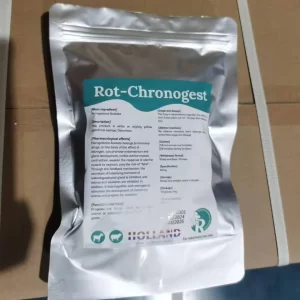
Rotter Doxycol WS
Contains per gram powder:
Doxycycline hyclate …………………. 100 mg.
Colistin sulphate …………….. 1 200 000 IU.
Carrier ad……………………………………… 1 g.
Gastrointestinal and respiratory infections caused by micro-organisms sensitive to doxycycline
and/or colistin like Bordetella, Campylobacter, Chlamydia, E. coli, Klebsiella, Haemophilus,
Mycoplasma, Pasteurella, Rickettsia, Salmonella, Staphylococcus and Streptococcus spp. in
calves, goats, poultry, sheep and swine.
Doxycycline belongs to the group of tetracyclines and acts bacteriostatic against many
Gram-positive and Gram-negative bacteria like Bordetella, Campylobacter, E. coli, Haemophilus,
Pasteurella, Salmonella, Staphylococcus and Streptococcus spp. Doxycycline is also active
against Chlamydia, Mycoplasma and Rickettsia spp. The action of doxycycline is based on
inhibition of bacterial protein synthesis. Doxycycline has good affinity towards the lungs and is
therefore especially useful for treatment of bacterial respiratory infections. Colistin is an antibiotic
from the group of polymyxins with bactericidal action against mainly Gram-negative bacteria like
E. coli, Haemophilus and Salmonella spp. Polymyxins interact strongly with phospholipids and
penetrate into and disrupt the structure of cell membranes. Administered orally, colistin is poorly
resorbed and, therefore, performs its action predominantly gastrointestinally.
Hypersensitivity to tetracyclines and/or polymyxins.
Administration to animals with seriously impaired renal and/or hepatic functions, animals with an
active microbial digestion or animals producing milk or eggs for human consumption.
Concurrent administration of penicillins, cephalosporins, quinolones and cycloserine.
For oral administration.
Calves, goats and sheep: Twice daily 1 g per 20 kg body weight for 4 – 5 days.
Poultry: 1 kg per 2000 litres of drinking water for 4 – 5 days.
Swine: 1 kg per 1000 litres of drinking water for 4 – 5 days.
Note: for pre-ruminant calves, lambs and kids only. Doxycol WS is not for use in animals from
which milk or eggs are produced for human consumption.
– For meat:
Calves, goats and sheep: 14 days.
Swine: 8 days.
Poultry: 7 days.
alterations may appear, such as intestinal dysbiosis, accumulation of gases or mild diarrhoea.

